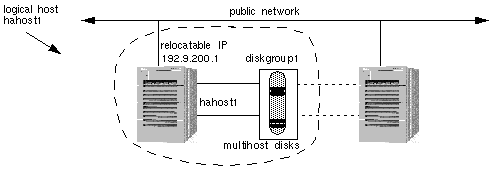1.5.8 Logical Hosts
In HA configurations, Sun Cluster supports the concept of a logical host. A logical host is a set of resources that can move as a unit between Sun Cluster servers. In Sun Cluster, the resources include a collection of network host names and their associated IP addresses plus one or more groups of disks (a disk group). In non-HA cluster environments, such as OPS configurations, an IP address is permanently mapped to a particular host system. Client applications access their data by specifying the IP address of the host running the server application.
In Sun Cluster, an IP address is assigned to a logical host and is temporarily associated with whatever host system the application server is currently running on. These IP addresses are relocatable--that is, they can move from one node to another. In the Sun Cluster environment, clients specify the logical hosts's relocatable IP addresses to connect to an application rather than the IP address of the physical host system.
In Figure 1-18, logical host hahost1 is defined by the network host name hahost1, the relocatable IP address 192.9.200.1, and the disk group diskgroup1. Note that the logical host name and the disk group name do not have to be the same.
Figure 1-18 Logical Hosts

Logical hosts have one logical host name and one relocatable IP address on each public network. The name by which a logical host is known on the primary public network is its primary logical host name. The names by which logical hosts are known on secondary public networks are secondary logical host names. Figure 1-19 shows the host names and relocatable IP addresses for the two logical hosts with primary logical host names hahost1 and hahost2. In this figure, secondary logical host names use a suffix that consists of the last component of the network number (201). For example, hahost1-201 is the secondary logical host name for logical host hahost1.
Figure 1-19 Logical Hosts on Multiple Public Networks

Logical hosts are mastered by physical hosts. Only the physical host that currently masters a logical host can access the logical host's disk groups. A physical host can master multiple logical hosts, but each logical host can be mastered by only one physical host at a time. Any physical host that is capable of mastering a particular logical host is referred to as a potential master of that logical host.
A data service makes its services accessible to clients on the network by advertising a well-known logical host name associated with the physical host. The logical host names are part of the IP name space at a site, but do not have a specific physical dedicated to them. The clients use these logical host names to access the services provided by the data service.
Figure 1-20 shows a configuration with multiple data services located on a single logical host's disk group. In this example, assume logical host hahost2 is currently mastered by phys-hahost2. In this configuration, if phys-hahost2 fails, both of the Sun Cluster HA for Netscape data services (dg2-http and dg2-news) will fail over to phys-hahost1.
Figure 1-20 Logical Hosts, Disksets, and Data Service Files

Read the discussion in Chapter 2, Planning the Configuration, for a list of issues to consider when deciding how to configure your data services on the logical hosts.
- © 2010, Oracle Corporation and/or its affiliates
